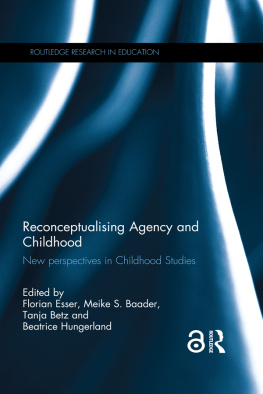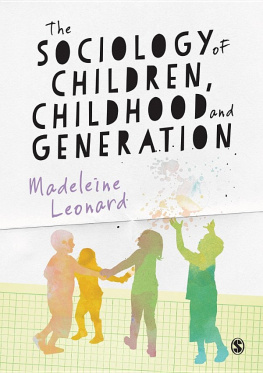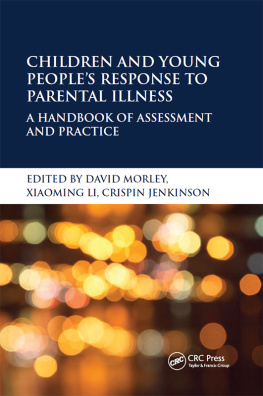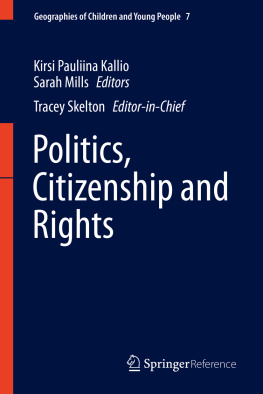
Children and Young Peoples Relationships
This book challenges the current state of childhood studies by exploring children and young peoples agency and relationships. It considers how recent theorisations of relationships and relational processes can move childhood studies forward, particularly in relation to re-thinking claims of children and young peoples agency and uncritical assertions around their participation and voice. It does this by bringing together case studies of childrens inter-generational and intra-generational relationships from both the Majority and Minority Worlds. The main themes include negotiated power, agency across contexts and negotiations of identity. The chapters show both the heritage of childhood studies, particularly within the U.K., and where it may be going. One of the key aims of the book is to add to the limited but growing cross-world dialogue that encourages cross-cultural learning from research and practice in both Majority and Minority World contexts leading towards a more integrated global approach to childhood studies.
This book was previously published as a special issue of Childrens Geographies.
Samantha Punch is a Senior Lecturer in Sociology in the School of Applied Social Science at Stirling University. Her research interests include rural childhoods and youth migration in Latin America and Asia, childrens food practices, sibling relationships and birth order in Scotland. Her recent publications include Global Perspectives on Rural Childhood and Youth (Routledge: 2007) and Sociology (with Harden, Marsh and Keating, Pearson: 2013).
E. Kay M. Tisdall is Professor of Childhood Policy at the University of Edinburgh. She is Programme Director of the MSc in Childhood Studies and Co-Director of the Centre for Research on Families and Relationships.
Children and Young Peoples Relationships
Learning across Majority and Minority Worlds
Edited by
Samantha Punch and E. Kay M. Tisdall
First published 2014
by Routledge
2 Park Square, Milton Park, Abingdon, Oxon, OX14 4RN
and by Routledge
711 Third Avenue, New York, NY 10017
Routledge is an imprint of the Taylor & Francis Group, an informa business
2014 Taylor & Francis
All rights reserved. No part of this book may be reprinted or reproduced or utilised in any form or by any electronic, mechanical, or other means, now known or hereafter invented, including photocopying and recording, or in any information storage or retrieval system, without permission in writing from the publishers.
Trademark notice: Product or corporate names may be trademarks or registered trademarks, and are used only for identification and explanation without intent to infringe.
British Library Cataloguing in Publication Data
A catalogue record for this book is available from the British Library
ISBN13: 978-0-415-82861-1
Typeset in Times New Roman
by Taylor & Francis Books
Publishers Note
The publisher accepts responsibility for any inconsistencies that may have arisen during the conversion of this book from journal articles to book chapters, namely the possible inclusion of journal terminology.
Disclaimer
Every effort has been made to contact copyright holders for their permission to reprint material in this book. The publishers would be grateful to hear from any copyright holder who is not here acknowledged and will undertake to rectify any errors or omissions in future editions of this book.
Contents
Samantha Punch and E. Kay M. Tisdall
E. Kay M. Tisdall and Samantha Punch
Lynn Jamieson and Sue Milne
Vicky Plows
Ruth Payne
Kate Bacon
Lorraine van Blerk
Kristina Konstantoni
Berry Mayall
The chapters in this book were originally published in Childrens Geographies, volume 10, issue 3 (August 2012). When citing this material, please use the original page numbering for each article, as follows:
Chapter 1
Introduction: Exploring children and young peoples relationships across Majority and Minority Worlds
Samantha Punch and E. Kay M. Tisdall
Childrens Geographies, volume 10, issue 3 (August 2012) pp. 241-248
Chapter 2
Not so new? Looking critically at childhood studies
E. Kay M. Tisdall and Samantha Punch
Childrens Geographies, volume 10, issue 3 (August 2012) pp. 249-264
Chapter 3
Children and young peoples relationships, relational processes and social change: reading across worlds
Lynn Jamieson and Sue Milne
Childrens Geographies, volume 10, issue 3 (August 2012) pp. 265-278
Chapter 4
Conflict and coexistence: challenging interactions, expressions of agency and ways of relating in work with young people in the Minority World
Vicky Plows
Childrens Geographies, volume 10, issue 3 (August 2012) pp. 279-292
Chapter 5
Agents of support: intra-generational relationships and the role of agency in the support networks of child-headed households in Zambia
Ruth Payne
Childrens Geographies, volume 10, issue 3 (August 2012) pp. 293-306
Chapter 6
Beings in their own right? Exploring children and young peoples sibling and twin relationships in the Minority World
Kate Bacon
Childrens Geographies, volume 10, issue 3 (August 2012) pp. 307-320
Chapter 7
Berg-en-See street boys: merging street and family relations in Cape Town, South Africa
Lorraine van Blerk
Childrens Geographies, volume 10, issue 3 (August 2012) pp. 321-336
Chapter 8
Childrens peer relationships and social identities: exploring cases of young childrens agency and complex interdependencies from the Minority World
Kristina Konstantoni
Childrens Geographies, volume 10, issue 3 (August 2012) pp. 337-346
Chapter 9
An afterword: some reflections on a seminar series
Berry Mayall
Childrens Geographies, volume 10, issue 3 (August 2012) pp. 347-355
How can we learn from research and practice in both Majority and Minority World contexts? How can we challenge the current academic area of childhood studies, with new and revised theorisations around children and young peoples agency and relationships? This special issue addresses these questions, capitalising on the intensive seminar series funded by the UKs Economic and Social Research Council. The series, titled Exploring Childrens Relationships Across Majority and Minority Worlds, was held between April 2010 and October 2011. It was organised by the Co-Directors and Associate Directors of the Centre for Research on Families and Relationships, a consortium research centre of Scottish universities. Most of the ideas presented in this special issue emerged out of lively discussions at these seminars and we gratefully acknowledge the contributions of all seminar participants.
We use the terms Majority World and Minority World (see also Panelli et al. 2007) to refer to what has traditionally been known as the third world and the first world or more recently as the Global South and the Global North. This acknowledges that the majority of population, poverty, land mass and lifestyles is located in the former, in Africa, Asia and Latin America, and thus seeks to shift the balance of our world views that frequently privilege western and northern populations and issues (Punch 2003). The dichotomy does risk over-simplicity: for example, the rising powers of countries such as Brazil, China and India do not sit easily within either category, and each category contains considerable and salient differences. At the same time, the dichotomy has proved a useful device to challenge thinking throughout the seminar series, particularly given the lack of learning across research conducted in these contexts. Across the papers, we generally use children and young people to refer to the age group under the age of 18, as defined by the UN Convention on the Rights of the Child (UNCRC). This phrase aims to respect that many older children prefer the category young people to children. Papers may use children, when referring particularly to childhood studies, childrens rights, and when using quotations.







